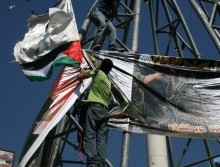 Internal Palestinian political issues and unsuccessful negotiations with Egypt have combined to place the Gaza Strip in an electricity crisis. The Ma’an News Agency has reported that Gaza’s lone power plant has shut down four times since mid-February, although the Palestinian Authority (PA) and Egypt are working on a deal for six months worth of Egyptian fuel.
Internal Palestinian political issues and unsuccessful negotiations with Egypt have combined to place the Gaza Strip in an electricity crisis. The Ma’an News Agency has reported that Gaza’s lone power plant has shut down four times since mid-February, although the Palestinian Authority (PA) and Egypt are working on a deal for six months worth of Egyptian fuel.
From 2007 until last year, fuel paid for by the PA had been supplied via the crossings with Israel into Gaza. However, last year the Gaza-leading Hamas organization decided to no longer receive the fuel via Israel, according to Maj. Guy Inbar, spokesman for the Israeli Coordinator of Government Activities in the Territories (COGAT).
Hamas had been relying instead on a smuggling tunnel network between Gaza and Egypt for supplies of fuel—the tunnels also used to bring in weapons for attacking Israel and consumer goods. But in February, according to the Ma’an report, Egypt put a stop to fuel deliveries via the tunnels—prompting the latest fuel drama.
Inbar said Israel offered to the PA weeks ago to deliver fuel into Gaza. On Friday, after receiving a PA request for the fuel, Israel’s COGAT opened the Kerem Shalom crossing into Gaza to transfer 450,000 liters of fuel paid for by the PA to temporarily alleviate the power crisis. However, the fuel was only enough to last until Sunday.
Inbar said the decision was made after “understanding the problems that are happening in Gaza because of this shortage of electricity and the damage for the civilian population in Gaza.”
The fuel transfer comes just weeks after the latest escalation that saw hundreds of Gaza rockets fired at Israel. Hamas refuse to recognize Israel and have been responsible for many terror attacks against Israel over the years.
Inbar, speaking by phone with The Mideast Update, emphasized that Israel does not have a responsibility to pay for the fuel to Gaza, which is covered by the PA, but that Israel will meet its requirement to let in fuel deliveries when they arrive.
“Israel never denied, and will not deny in the future, the transfers of fuel to Gaza through Israeli crossings,” said Inbar.
Though the PA delivered the funds for the latest round of fuel to Hamas-led Gaza, they are themselves led by Fatah—the political rival to Hamas. Fatah, the political faction led by PA President Mahmoud Abbas, reached a general reconciliation agreement with Hamas last May to try and end a five-year rift between the groups, but the deal has yet to be implemented.
In the past, the power problems in Gaza became a point of contention between the groups. An anonymous Israeli official who did want not to be named said “internal issues” between Hamas and the PA, such as Hamas failing to pay for the fuel, has led to the multiple power shortages in Gaza over the last two to three years. It appears that that is again becoming the case.
The WAFA Palestinian news agency, which is linked to the PA, reported that PA Prime Minister Salaam Fayyad accused Hamas of failing to show up to a meeting in Cairo aimed at handling the latest fuel crisis. WAFA said the discussions were set to set up a means for consistent fuel to Gaza, as well as payment.
Hamas’ desire to receive fuel from Egypt and not Israel has compounded what was already a complex situation. Ma’an reported that part of the complication with Egypt is Hamas’ desire to receive fuel via the Rafah border crossing, which Egypt says doesn’t have the capacity for such service.
(By Joshua Spurlock, www.themideastupdate.com, March 27, 2012)
